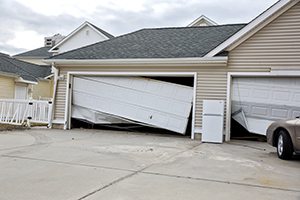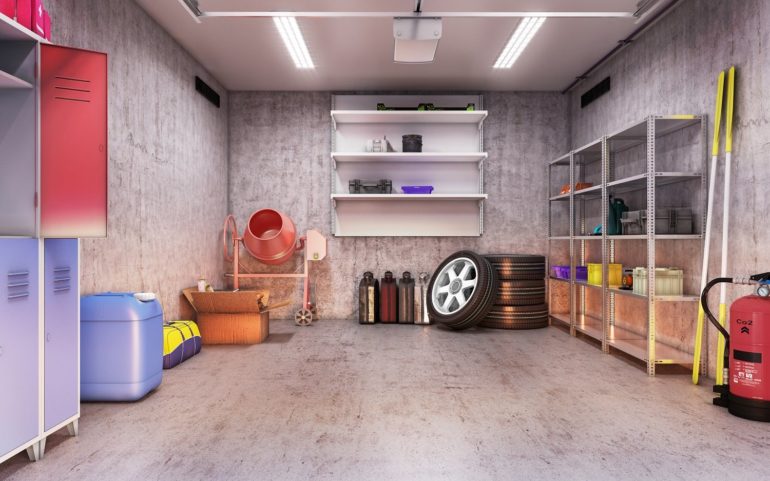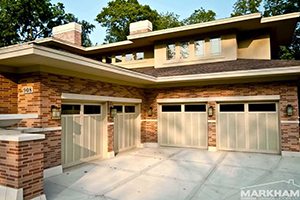How to Protect the Most Expensive Thing in Your Garage
Unless you’ve managed to squeeze a cabin cruiser into your garage, your car is probably the most expensive thing in it.
While the general feeling is that, once it’s in the garage, your car is ‘protected’, the reality can be quite different.
From something falling off a shelf and damaging the car, to scratching it as you work around it, or the kids leaning their bikes against it, there are many ways that the garage can be a bit of a hostile environment for your car.
So, while your garage protects your car from things like sun and snow, there are other hazards in the garage that can actually make it quite damaging to your car.
Protect Your Car in the Garage
The following are just some of the ways you can safeguard your car while it’s in the garage.
1. Close the Garage Door
In summer, it’s easy to just leave the garage door open some days because you’re in and out of the garage so often. In winter, you might open the door to warm-up the car before you leave for the day. Sometimes you might stop the garage door opener before the door closes completely.
It’s no surprise, but a car insurance company published information that shows open garage doors make it more likely that your car will be stolen.
To put it another way, the old movie “Gone in 60 Seconds” had it right. It takes less than a minute for a thief to drive off in your car. In fact, some estimates put it down to 10 seconds!
2. Park in the Right Spot
Parking your car in the garage as far away from hazards as possible, and even not hitting anything as you park it, goes a long way to protecting it. But that can be tough to do when it’s difficult to know exactly how close you are to objects.
One of the most popular, and simple, ways to park your car perfectly every time is the “tennis-ball-from-the-ceiling” trick. It begins by finding the perfect place for your car to come to a stop while parking it in the garage. You may need someone outside the car to help you.
Once you find the spot, hang a tennis ball from the ceiling so that, as you park, it would contact the windshield in line with your rearview mirror. Every time you park, when the tennis ball touches the windshield at a point in line with the mirror, you know the car is perfectly aligned front and back and side-to-side. And if it doesn’t quite line up every time, you’ll know just how far off you are and can decide whether that’s good enough.
Or you can try a more 21st-century approach with garage door opener manufacturer Liftmaster’s laser-guided parking assist accessory.
3. Stop Dinging Your Doors
Even if you find the perfect parking spot to minimize damage to your car, you still might need to be careful when you open the doors. If not, the door can hit the garage wall or another object in the garage. You can attach pool noodles on the wall or objects the doors might hit to stop them from being damaged.
Needless to say, it’s worth doing everything you can to protect the most expensive thing in your garage. If you’re looking for a more secure garage door or garage door opener, call us at 905-472-9178 or contact us online.
5 Ways to Reduce Your Chances of Needing Garage Door Repair
You might not think of it this way, but one of the most amazing facts about your home is that you don’t need garage door repair more often.
Think about it. It’s the largest, heaviest and one of the most frequently used moving objects in your home. The next largest moving object (maybe your front door?) is a fraction of its size. Even your garage door opener, which lifts and lowers this massive moving object every day, can give you decades of repair-free operation. Wouldn’t life be great if you got that kind of performance from everything in your home, like your washing machine?
But that remarkable track record of worry-free operation can leave you unprepared. Your garage door and door opener aren’t infallible. They can break, stop working and need emergency repairs. For you, the real problem can be that when you need a garage door repair, you’ll be stranded, either inside or outside of your garage.
How to Minimize Your Garage Door Repair
While it’s not necessarily a terrible situation, the need for garage door repair can happen at inopportune times. Fortunately, there are steps you can take to reduce the chances of it happening.
1. Keep Stuff Away from the Door
If you’re like most people, you use every available space in your garage to store things – even your car sometimes!
But you should never store anything too close to the door for a number of reasons. First, stacking boxes just inside the door can present a hazard of them falling on you when you open the door.
But even storing things at the sides of the door can be a problem. The cables on either side of your door help to keep the door balanced as it opens and closes. In the closed position, the cables remain fairly close to the door, making it look like you have more space than you actually do. But when the door opens, the cables are pulled back into space just behind them. Anything you store in that space just behind the cable might get damaged when the door opens and closes, and the cables may stretch or fray over time.
2. Keep Your Eyes Peeled
You should regularly give your door and opener a visual inspection. Check that the bottom of the door meets the garage floor evenly across the width of the door. Look for signs of corrosion metal parts. And watch the path of the door as it opens and closes to make sure it moves smoothly throughout the operation.
3. Listen Carefully
Simply due to its sheer size, your garage door can make some noise as it operates. But any change in the sound it makes can be a sign of an impending repair. Any sort of grinding, scraping or other unusual sounds should be investigated immediately.
4. Make Your Garage Door Part of Your Regular Home Maintenance Schedule
“Clean the eavestroughs” is on it. So is “replace the furnace filter”. And those things get done, right? But “inspect your garage door” probably isn’t on your list of “things to do” around the house. But if you put it there, it’ll get done and you’ll be less likely to need a garage door repair.
5. Don’t DIY
Yes, your garage door is huge. It is very heavy. It’s balanced by cables and springs that are under high tension. And if you decide to work on your garage door yourself, you’ll probably need to disconnect it from the garage door opener, which means all the safety systems are disconnected. The potential for needing even more repairs to the door, and the threat to your personal safety, are very high.
Stating it as simply as possible: do not try garage door repair yourself.
Instead, call the repair experts at Markham Garage Doors at 905-472-9178!
Impact Damage Or Wear-And-Tear Can Lead To Broken Garage Door Panels

But any rationalization or justification is seldom needed in such cases because there is a large element of truth to these statements – accidents do happen and few things will last forever. This concept can also be applied to the lifecycle of such garage door parts as:
- Springs and cables
- Hinges and rollers
- Automatic Openers
- Sections or panels
Due to their exterior exposure, garage door panels often face situations or conditions that will cause them to break and therefore need to be repaired or replaced. The types of circumstances that may lead to broken garage door panels can include:
- Simple aging
- Lack of regular maintenance
- Weather-related damage
- Warping, cracking, decay
- Mold and mildew formation
- Freezing-and-thawing cycles
- Impact-related damage
- Vehicle contact
- Baseballs or hockey pucks
- Wind-blown debris
- Inadvertent dents and scratches
Depending on the extent of the damage, and maybe the age of the garage door as well, homeowners will be faced with the dilemma/decision to either replace the entire door or replace the broken panel only. This decision may largely influence the cost of purchasing and installing a new garage door versus the cost of the labour and the materials needed to repair/replace any or all the panels.
For an assessment of the pros and cons of both options, homeowners may wish to call upon the knowledge and experience of professional garage door installers such as Markham Garage Doors.
Replacing Broken Garage Door Panels Requires Intricate Skills And Experience
Should a decision be made to replace one or more of the broken garage door panels, there are a number of intricate steps that need to be performed in a specific sequence. Due to the complexity of these repairs, it might be advisable to utilize a professional service.
The process for removing and replacing broken garage door panels consists of:
- Buying the appropriate replacement panels from the door manufacturer
- Lowering the door to the closed position
- Unplugging the automatic garage door opener (if applicable)
- Removing the spring or springs to relieve all tension from the garage door
- Making room to lift out the broken panels by removing the top panel
- Detaching each broken panel from adjacent panels and the guide track
- Replacing the broken panels by reversing the steps outlined above
- Re-finishing the entire door (if required) to ensure uniformity with all panels
Although all of the panel removal and replacement steps can be intricate or delicate in nature, the most potentially hazardous/dangerous steps likely relate to the removal and reinstallation of the garage door springs. There is a significant amount of tension/torsion stored within these springs and, to prevent possible injury and/or collateral damage, any adjustments should be left in the hands of skilled and experienced professionals, such as the team from Markham Garage Doors.
Accidents and wear-and-tear are common causes of broken garage door panels. If your garage door has one or more broken panels, call the specialists at Markham Garage Doors today at (905) 472-9178 or (416) 570-3667to discuss your options for a fast and affordable solution.


